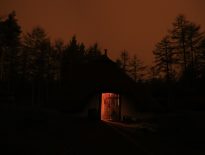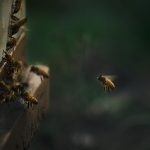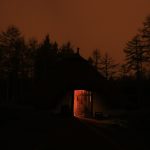I am like a stranger, relegated to the background in my home as I watch the festival preparations from my vantage point on my late father’s balcony. Women crowded in groups around several fires, cooking different meals, while the men slaughtered the animals for the ceremony. The children chased each other around playfully. The whole town was celebrating, and I smiled as I watched. I remember celebrating this festival some thirty-two years ago—me and my peers —when I was just a boy of fifteen. I scanned the area for my wife and kids, but I couldn’t find them. They’d followed my sister to the market.
“Is that you, Dolapo?” The voice drew me from my thoughts. There they were—Dayo, Gbenga, Yinka, and Ibukun. I’d not seen them in thirty-two years. Nostalgia hit me like a water wave.
“Yes, it is me. I am coming.” As I trudged down the stairs, I remembered the time I left and the promise we made to ourselves. I never kept it. I have been running for thirty years. I shivered in anticipation of my reception as I walked up to them.
“Welcome home.” Yinka’s high-pitched voice brought back sweet memories. He gave me a hug that squeezed my ribs so hard that I grimaced in pain.
“Yes, the prodigal has finally returned.” The tone of the voice was harsh.
“Ibukun, not now!” Yinka restrained him. I could hear the plea in his voice.
Ibukun forced a smile. “Welcome home, Dolapo.” He stretched out his hand, and I shook it. It was not a warm handshake, but at least it betrayed some emotions, and for that I was grateful. I took turns greeting the others, awkward as the entire ritual was.
“Do you take beer?” Dayo asked me in a manner that reflected his disappointment at not knowing whether I drank or not.
“I do,” I answered.
“Haa… Let’s go to the parlour and… talk.”
“But the festival?”
“Oh, don’t worry about it. We will still make it in time for the grand finale,” Gbenga replied. “The beer parlour is not far from here. You remember Mama Fathia’s palm wine shop?”
Startled by the question, I answered, “She’s still alive?”.
He laughed. “Yes, she is. But she’s retired and very old now. Fathia is in charge of the shop, selling beer and pepper soup. You will like what she’s done with the place.”
“Now that I think about it, she liked you once. So, we might get a discount.” We all laughed at Ibukun’s joke. It was the icebreaker we needed. For the first time since meeting my friends, I relaxed. We reminisced as we trudged the small path to Mama Fathia’s parlour, pointing at houses and telling tales of the old days.
“Wait, is that not Iya Agba’s house?” I singled out an old thatched-roof hut surrounded by tall trees. The compound was abandoned, and the weeds claimed every space they could find, even the windows and doors.
“Yes, it is. She died some months after you left.”
“Ahhh, what a woman!” I said wistfully. I remembered how Iya Agba would gather children in her compound in the evening, give each of us a piece of dried fish, and tell stories of the past. She was the oldest in the community at the time and was well respected. “But how could this place be left like this? What about her children? Don’t they visit?”
“They came home when she died. They’ve not been here since. At least, that’s what my mother tells me whenever I ask.”
I looked at Yinka incredulously. “What do you mean, ask? You should know since you live here.”
He stared at me hotly, a look they all shared. Suddenly, I felt foolish. “Did you think you were the only one of us who left? We all left for school and now work. But we come back every year.”
“That was the promise we made to each other or did you forget?” Ibukun jibed.
“I didn’t” I protested weakly. “I am sorry.” We’d stopped walking at this point.
“Sorry?” Gbenga asked. “You didn’t even come home for your father’s funeral—your father!” he barked out the words.
“You wouldn’t understand…”
“Try us.” Yinka folded his arms as he answered. I couldn’t speak. I just stared at the floor. “No answer?” He hissed and walked away. The rest of us followed him in silence until we got to the bar. Though the parlour wasn’t far from my house, it felt like we’d been walking for hours. I was tired.
The bar was so different from what I remembered. It was modern and cleaner. We sat down at a corner table and placed our orders—beer and beef pepper soup. While waiting for our food, Fathia came to our table and playfully bantered with my companions. She froze in astonishment when she noticed me. She looked back at my friends, and a realization hit her. All of a sudden, she drew me into a tight hug.
“You came.” She said without releasing me from her embrace. She studied me for a few minutes. “You look well. That’s good.” The waiter came back with our order. “Serve them everything they want. It’s on the house.”
“I said it!” Ibukun shouted triumphantly. “We will drink for free today.” The cheers were deafening. Even Fathia couldn’t restrain a laugh. “It’s only for today,” she said, eyeing me. “Because Dolapo has come home.”
After everyone had settled down, Gbenga asked me the question they’d been meaning to ask: “Why? Why didn’t you return as you promised? As we promised! Every year, we would all come together to celebrate our friendship. It was your idea for us to gather like that. But every year, you were nowhere to be found. Even when your dad died. Why, Dolapo?”
“He told me never to come back, even if I heard he died.”
“Your dad?”
“Yes, my dad.” I downed my beer. “You all remember Baba Fagbenro, my uncle?” They nodded. “Well, I don’t know if you know this, but he died the same year I left. Customarily, the family oracle needed a replacement, and I was chosen. My father refused. He believed in education and was wealthy enough to send me to the university.”
“To send all of us… Any child who wanted to further their education, he sponsored.” Dayo sighed as he spoke. “Your father was a great man.”
“He was. My greatest regret is that I couldn’t be by his side when he breathed his last.” I wiped off the tears that threatened to fall from my eyes and continued my story. “I also didn’t want to be a priest. My father’s refusal caused a serious rift in the family, which led to threats. Life-threatening ones. In fear, my father sent me secretly to his friend in Ibadan with a letter. He instructed his friend to send me abroad to further my education. Before I left, he gave me a warning. That I must not come back home, no matter what. He said if I was to come home, several years must have passed. He died four years later, as you know.”
“Why didn’t you tell us all this before you left?” Yinka said.
“I wanted to, but I couldn’t. My father swore me to secrecy. I missed everyone—all of you. But I couldn’t come home. I got married in the US. My wife and kids are here with me. I would love you all to meet them.”
“We will love that too,” Yinka replied.
“So am I forgiven?”
“If you will always come home. We love to come and celebrate ourselves, our friendship, and the community. So, promise us that this won’t be your last visit.”
“I promise.” As I said those words, I heaved a sigh of relief. I was home again, a boy of fifteen running around with my friends. I had been haunted and had lived my entire life afraid of my shadow. But for the first time in thirty-two years, I felt free.
The festival was almost done when we got back. People were eating and drinking. Some were dancing to the music blaring from the speakers. I saw my kids with other children, running around like I once did. Just then, a loud gong sounded and halted all activities. Everyone—old or young, man or woman, rich or poor—gathered together, forming a circle. A small, bald man walked into the centre and knelt. We all did the same. And he prayed blessings upon the community for the next year.
Read – Red Sky in the Morning – A Short Story by Marisa Kelly, Namibia







